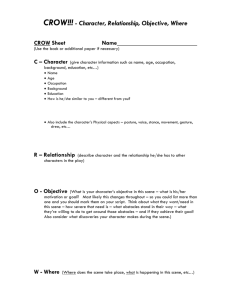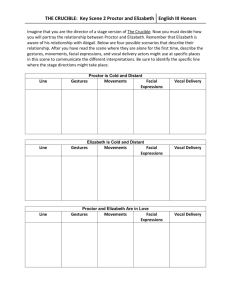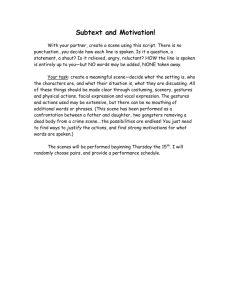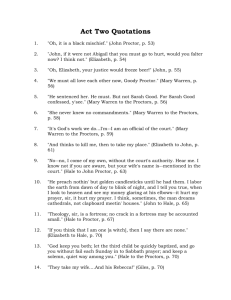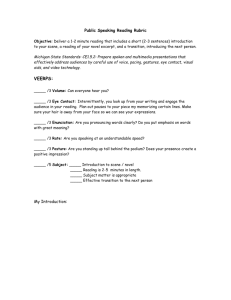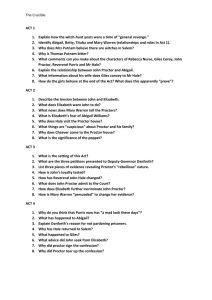The Crucible | Suggested Essay Topics
advertisement
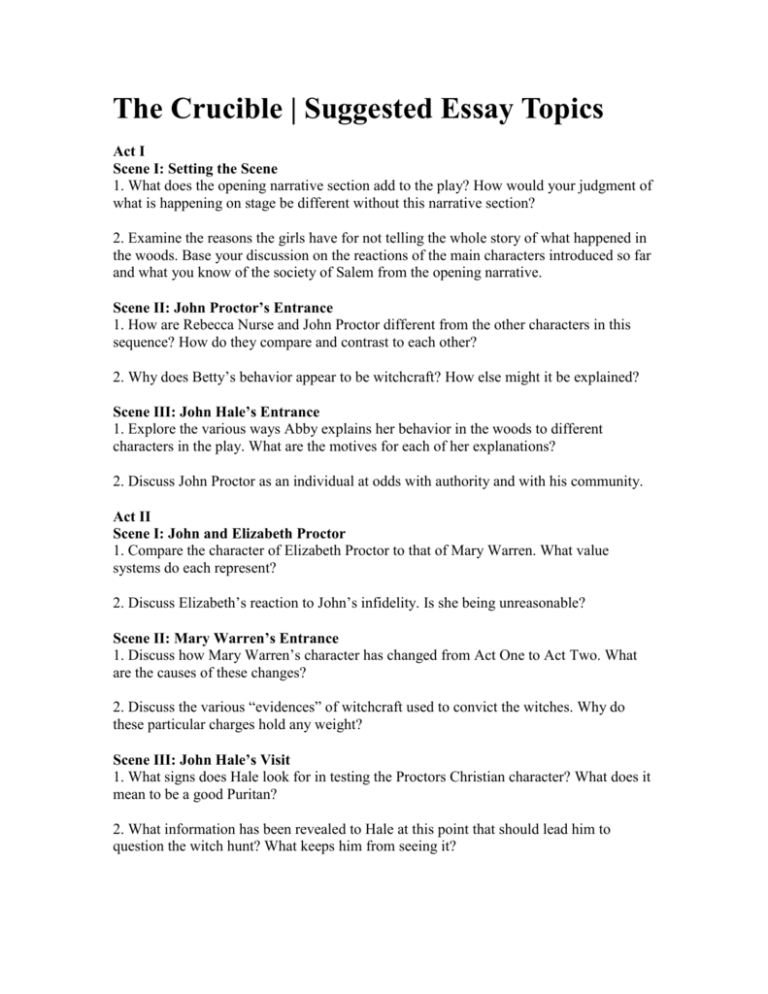
The Crucible | Suggested Essay Topics Act I Scene I: Setting the Scene 1. What does the opening narrative section add to the play? How would your judgment of what is happening on stage be different without this narrative section? 2. Examine the reasons the girls have for not telling the whole story of what happened in the woods. Base your discussion on the reactions of the main characters introduced so far and what you know of the society of Salem from the opening narrative. Scene II: John Proctor’s Entrance 1. How are Rebecca Nurse and John Proctor different from the other characters in this sequence? How do they compare and contrast to each other? 2. Why does Betty’s behavior appear to be witchcraft? How else might it be explained? Scene III: John Hale’s Entrance 1. Explore the various ways Abby explains her behavior in the woods to different characters in the play. What are the motives for each of her explanations? 2. Discuss John Proctor as an individual at odds with authority and with his community. Act II Scene I: John and Elizabeth Proctor 1. Compare the character of Elizabeth Proctor to that of Mary Warren. What value systems do each represent? 2. Discuss Elizabeth’s reaction to John’s infidelity. Is she being unreasonable? Scene II: Mary Warren’s Entrance 1. Discuss how Mary Warren’s character has changed from Act One to Act Two. What are the causes of these changes? 2. Discuss the various “evidences” of witchcraft used to convict the witches. Why do these particular charges hold any weight? Scene III: John Hale’s Visit 1. What signs does Hale look for in testing the Proctors Christian character? What does it mean to be a good Puritan? 2. What information has been revealed to Hale at this point that should lead him to question the witch hunt? What keeps him from seeing it? Scene IV: Cheever and Herrick’s Entrance 1. What is it that finally motivates Proctor to get involved? 2. How are the “little crazy children jangling the keys of the kingdom?” Act III Scene I: Charges of Fraud 1. How do the stage directions add to the understanding of the themes of the play? 2. Some critics have called Judge Danforth a “cardboard villain,” too unrelentingly evil to be believed. Is this a fair assessment of the character? Scene II: Mary Warren’s Deposition 1. What is Giles Corey’s role in the play? 2. Examine Elizabeth Proctor as a symbol of truth. How has her husband “paid for” this truthfulness? Scene III: Abigail’s Rebuttal 1. What motivates Elizabeth to lie? Is a good name more important than the truth? 2. How is Mary Warren used by both sides? Does she have an individual identity? Act IV Scene I: Reverend Parris’ Doubts 1. Has Parris experienced moral development or is he merely attempting to stay on the right side of public opinion? 2. How is Tituba’s understanding of the devil different from that of most citizens of Salem? Scene II: Elizabeth and John Contemplate Confession 1. How is the conversation between husband and wife in this scene different from the opening scene of Act Two? 2. Elizabeth will not give her advice to John, but how does she influence him? Scene III: John Proctor’s Decision 1. How would Proctor be saving his good name no matter which choice he made? Why does he choose as he does? 2. Some critics find it hard to believe Proctor’s choice of death. Discuss his decision based on his relationships with other characters throughout the play.


